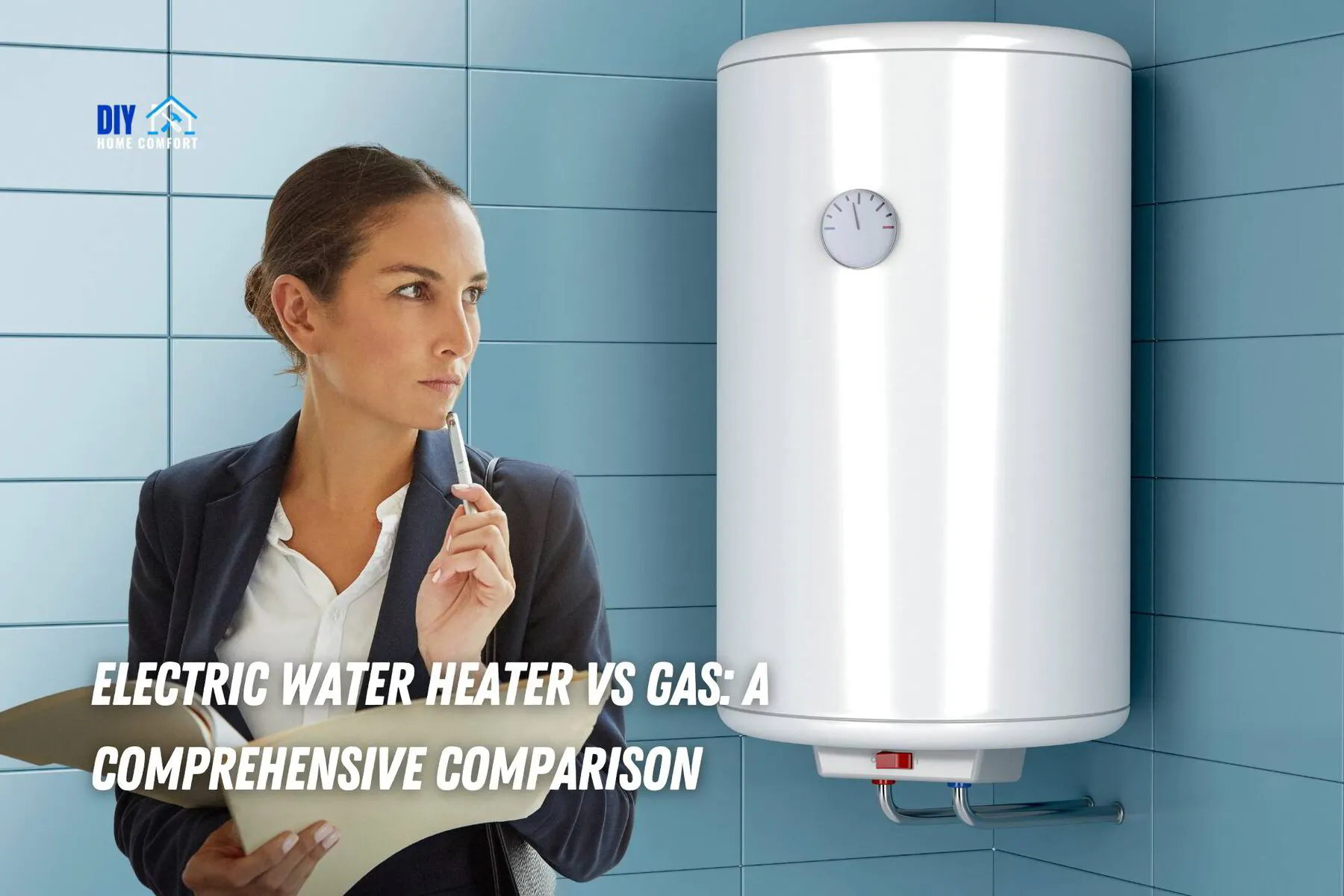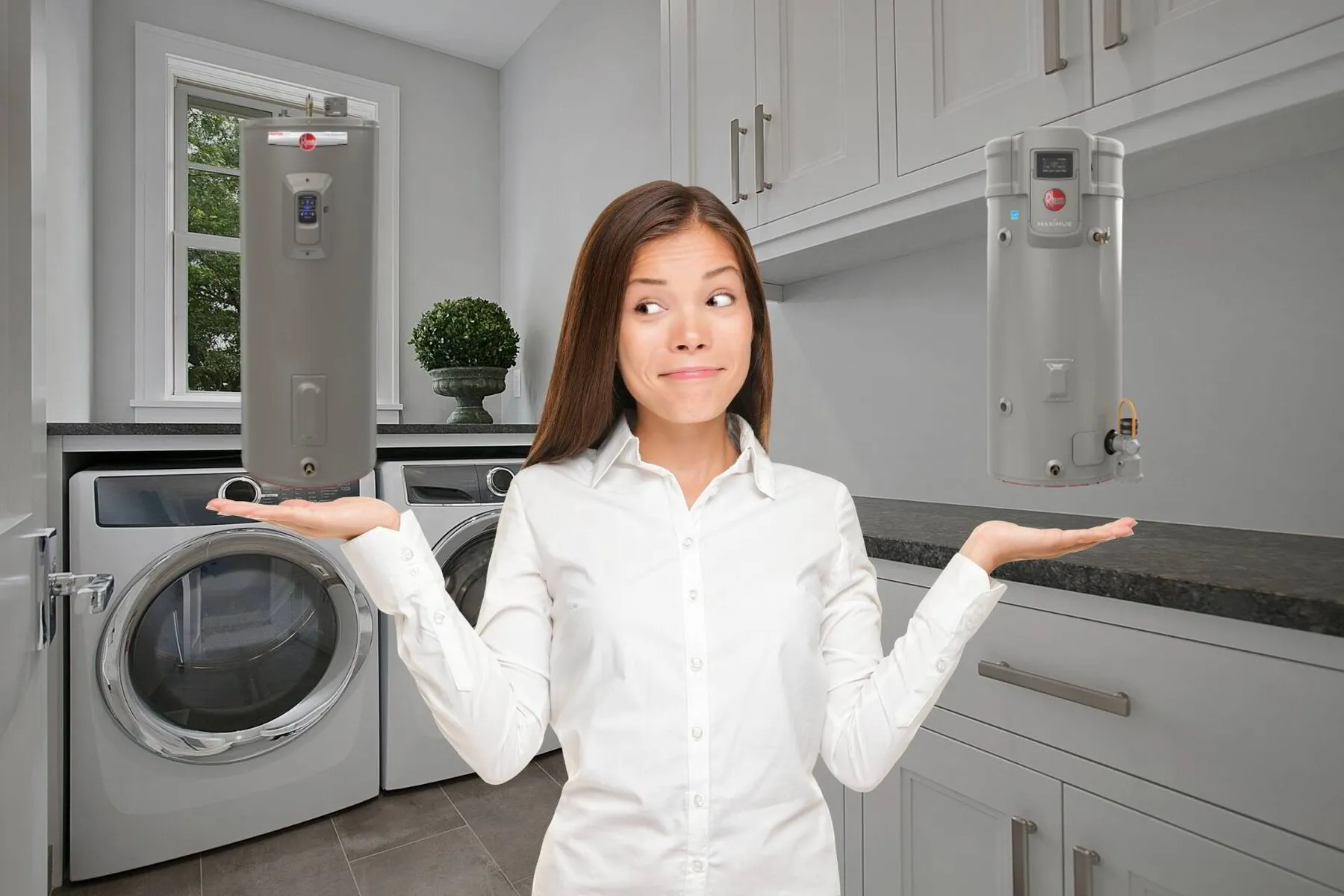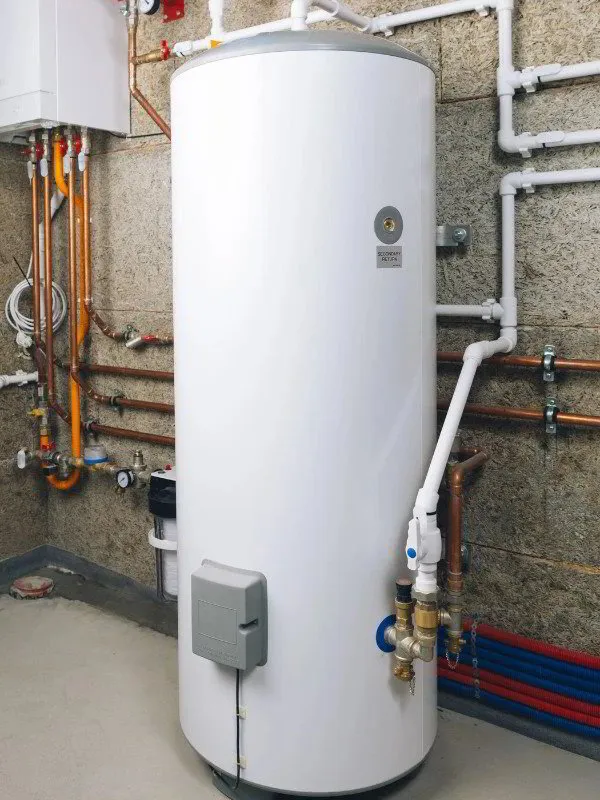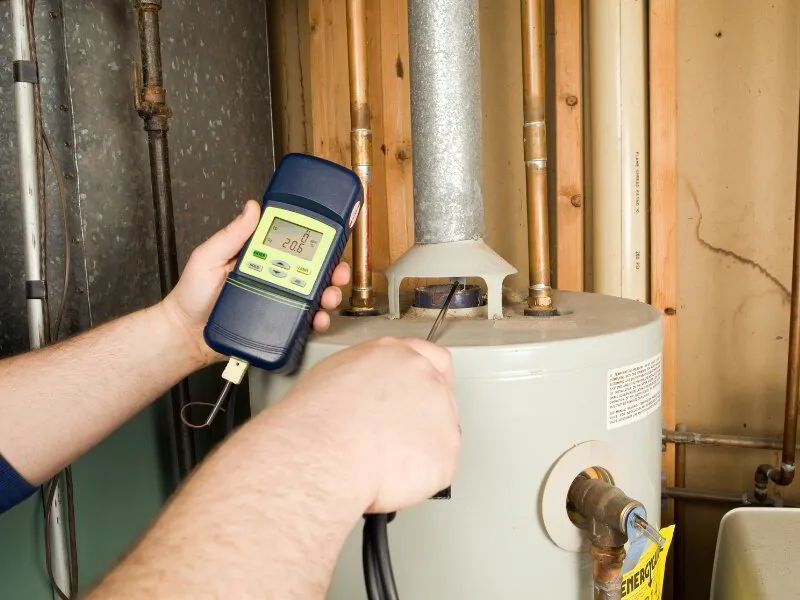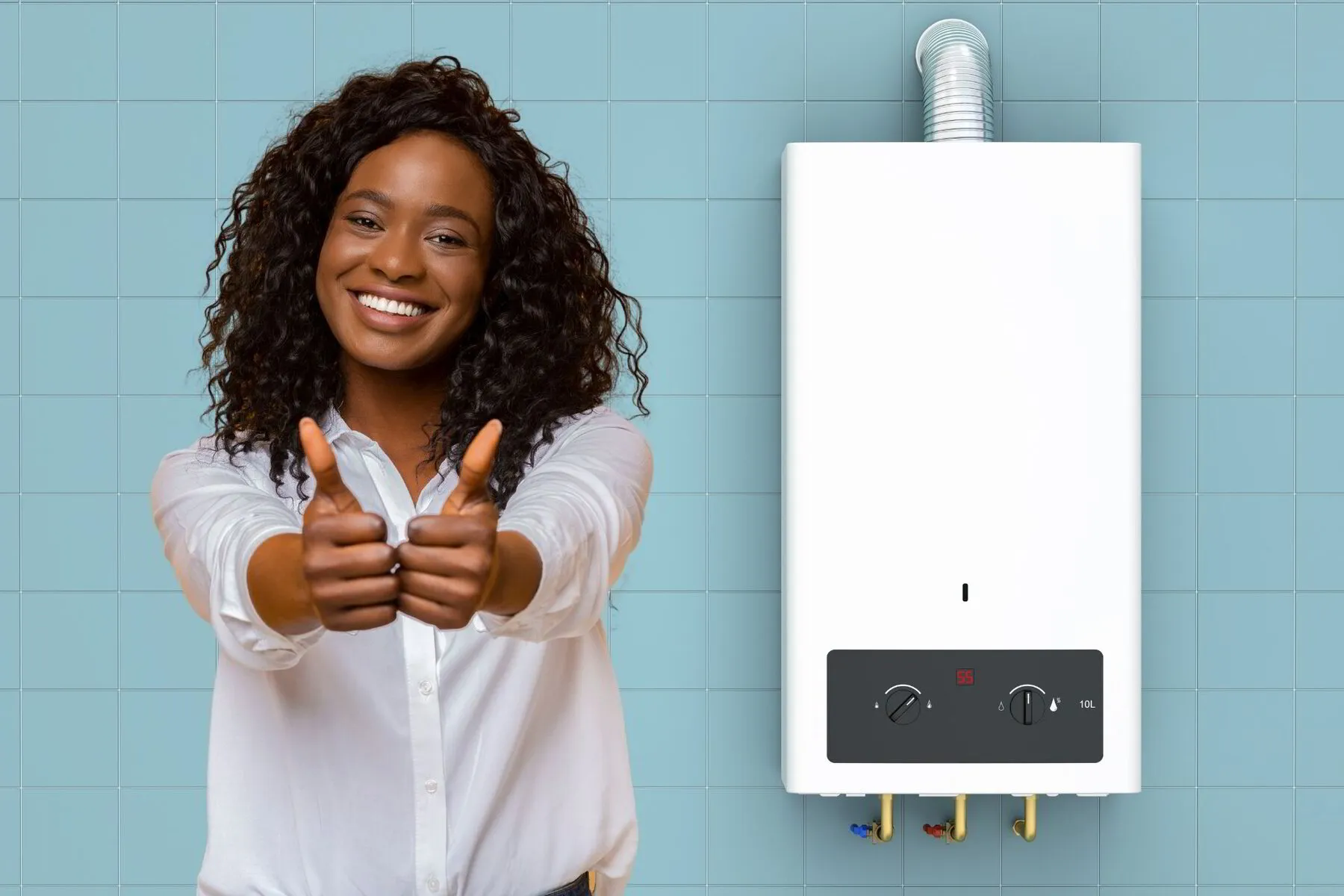If you're in the market for a new water heater, you will likely decide between electric and gas models.
Each type of water heater has its advantages and disadvantages, so it's essential to understand the differences before making a decision.
In this article, we'll take a comprehensive look at electric water heaters and gas water heaters, exploring their fundamental differences, pros and cons, and other important considerations.
📘 Key Takeaways
- Electric water heaters boast high efficiency, user-friendly operation, and superior safety due to the absence of gas leaks or combustion risks.
- Gas water heaters are praised for their rapid heating capability, energy efficiency, and providing consistent hot water supply.
- While electric heaters have a higher upfront cost, they are more energy efficient as they convert virtually all consumed energy into heat.
- Installation processes differ: electric models require a dedicated electrical circuit, while gas models need proper ventilation and a gas supply connection.
- Despite a higher initial cost, gas water heaters typically have lower operating costs owing to the cheaper cost of natural gas or propane.
What is an Electric Water Heater?
An electric water heater, as the name suggests, uses electricity as its primary power source. It consists of a tank that holds and heats the water using electric resistance coils, also called heating elements.
When you turn on the hot water tap, cold water enters the tank, and the heating elements warm it to the desired temperature. The heated water is then stored in the tank until you need it.
Electric water heaters are known for their efficiency and ease of use. They are relatively simple to install and maintain, making them a popular choice for many households.
Additionally, electric water heaters are generally safer than gas water heaters, as there is no risk of gas leaks or combustion. Electric water heaters can provide a continuous hot water supply as long as there's power.
However, their flow rate might be lower than gas heaters, potentially making it difficult to meet high demand if multiple outlets use hot water simultaneously.
Their performance depends on the heater's size, incoming water temperature, and household hot water demand. Electric water heaters also offer precise temperature control, allowing you to adjust the water temperature to your preference.
What About Tankless Water Heaters?
Tankless water heaters, or on-demand heaters, heat water directly without storage tanks. They're activated when a hot water tap is turned on, with an electric element or gas burner heating the water.
This ensures a constant hot water supply without waiting for a tank to fill. These heaters are more energy-efficient than traditional ones as they avoid standby energy losses. However, their flow rate is limited, often providing 2-5 gallons per minute.
This can be insufficient for large households needing hot water for multiple uses simultaneously. Some households solve this by installing multiple heaters or dedicated heaters for high-demand appliances.
Despite these challenges, their compact size, longevity, and potential energy savings make tankless water heaters an appealing choice for many homeowners.
What is a Gas Water Heater?
A gas water heater, on the other hand, utilizes natural gas or propane to heat the water. It also has a tank that holds the water, but instead of electric heating elements, it relies on a gas burner to heat the water.
When you turn on the hot water tap, cold water enters the tank, and the gas burner ignites to heat the water. The heated water is then stored in the tank until you use it.
Gas water heaters are known for their fast heating capabilities. The gas burner can quickly heat the water, providing hot water in a matter of minutes. This makes gas water heaters ideal for households with high hot water demand, such as large families or commercial establishments.
In addition to their fast heating capabilities, gas water heaters are also energy-efficient. Natural gas and propane are relatively inexpensive compared to electricity, making gas water heaters a cost-effective option in the long run.
However, it is crucial to ensure proper ventilation when using a gas water heater to prevent the buildup of carbon monoxide.
Gas water heaters also offer the advantage of a continuous hot water supply. As long as there is a gas supply to heat water with, the burner can keep heating the water, ensuring that you never run out of hot water.
Some gas water heaters have advanced features such as digital temperature control and energy-saving modes.
Overall, both electric and gas water heaters have their advantages and considerations. The choice between the two depends on factors such as energy availability, hot water demand, and personal preferences.
It is important to consider these factors carefully and consult a professional to determine the most suitable hot water heater for your needs.
Energy Efficiency
When choosing a gas vs electric water heater, energy efficiency is a crucial factor to consider. Electric high-efficiency water heaters have a reputation for being more energy efficient compared to gas water heaters.
Electric heaters are designed to convert nearly all the energy they consume into heat, minimizing energy waste. On the other hand, gas water heaters may lose some energy through the exhaust gases produced during the combustion process.
Furthermore, electric water heaters do not require fuel combustion, which means there is no risk of energy waste associated with burning fuel. This can be particularly advantageous in reducing environmental impact and promoting sustainability.
Installation Process
The installation process for a water heater can be complex, and the requirements vary between electric and gas hot water heaters.
Electric water heaters typically require a dedicated electrical circuit to operate efficiently. This means that during installation, an electrician may need to install a new circuit or modify the existing electrical system in your home.
On the other hand, gas water heaters require proper ventilation and a gas supply connection. This means that during installation, a plumber or HVAC technician may need to ensure that the ventilation system is adequate to prevent the buildup of harmful gases.
Additionally, the gas line supply connection must be correctly installed to ensure safe and efficient operation. It's essential to note installing a gas heater may involve additional safety measures to prevent potential gas leaks.
This can include the installation of a gas shut-off valve and the use of gas leak detection devices.
Operating Costs
Operating costs are another vital consideration when comparing electric and gas water heaters.
Gas heaters typically have lower operating costs than their electric water heater counterparts. This is primarily due to the cost of the fuel used. Natural gas or propane, commonly used in gas heaters, are often less expensive than electricity.
However, it is essential to consider that the exact operating cost will depend on various factors. Fuel prices can vary significantly depending on your location, so it's essential to research the current rates in your area.
Additionally, the efficiency of the specific water heater model you choose will also impact the operating costs. Higher efficiency models may have a higher upfront cost but can provide long-term savings through reduced energy consumption.
It's worth noting that some areas offer incentives or rebates for choosing energy-efficient water heaters. These incentives can help offset the initial cost and make the overall operating costs more affordable.
Safety Considerations
Electric water heaters offer advantages in terms of safety. Unlike gas water heaters, there is no risk of gas leaks or combustion-related accidents. This is particularly important in households with children or elderly individuals, where safety is a top priority.
Additionally, electric heaters do not produce carbon monoxide (CO), a potentially dangerous byproduct of gas combustion that needs to be correctly vented. This eliminates the need for additional ventilation systems or the worry of carbon monoxide poisoning.
Furthermore, electric water heaters are equipped with safety features such as temperature and pressure relief valves. These valves help prevent overheating or excessive pressure buildup, reducing the risk of accidents or damage to the unit.
With these safety measures in place, homeowners can have peace of mind knowing that their electric water heater is a safe and reliable option for providing hot water.
Maintenance Requirements
When it comes to maintenance, electric water heaters have an advantage. They typically have fewer components than gas heaters, reducing the chances of parts failure or malfunction.
This means that homeowners can enjoy a lower maintenance cost and less frequent repairs. Additionally, electric heaters do not require regular cleaning of burners or vent systems, simplifying the maintenance process even further.
Moreover, electric water heaters are known for their durability and reliability. With fewer moving parts and no combustion process, there is less wear and tear on the unit. This translates to a longer lifespan and fewer instances of breakdowns or malfunctions.
Homeowners can save time and money by choosing an electric water heater that requires minimal maintenance and provides a consistent hot water supply.
Lifespan and Durability
Electric water heaters generally have a longer lifespan compared to gas models. This is because they have fewer parts that can wear out or fail over time.
With proper maintenance, an electric water heater can last up to 15 years or more, while gas water heaters usually have a lifespan of around 10-12 years.
This extended lifespan not only saves homeowners money in terms of replacement costs but also reduces the environmental impact of disposing of old units.
In addition to their longer lifespan, electric water heaters are also known for their durability. They are less susceptible to corrosion and rust, which can be common issues with gas water heaters.
The absence of a combustion process eliminates the risk of corrosive byproducts, ensuring that the tank and other components remain in good condition for extended periods.
This durability makes electric water heaters a reliable choice for homeowners looking for a long-term hot water solution.
Furthermore, the durability of electric water heaters contributes to their energy efficiency. With fewer parts that can degrade over time, the unit can maintain its efficiency throughout its lifespan.
This means that homeowners can enjoy consistent energy savings and lower utility bills without worrying about a decline in performance.
Environmental Impact
Gas water heaters tend to have a higher carbon footprint than electric models. Burning natural gas or propane results in the emission of greenhouse gases, contributing to climate change.
However, advancements in gas water heater technology have led to more efficient models with reduced emissions.
One way gas water heaters have become more environmentally friendly is through condensing technology. This technology allows the water heater to extract more heat from the combustion process, resulting in less wasted energy and lower emissions.
Additionally, some gas water heaters have built-in timers and programmable settings, allowing users to optimize energy usage and reduce their environmental impact.
Availability of Fuel Source
Another factor to consider is the availability of the fuel source in your area. Gas water heaters rely on a steady supply of natural gas or propane.
If you live in an area without access to natural gas and propane, electric water heaters may be a more feasible option. However, it's worth noting that the availability of natural gas is expanding in many regions.
With the increasing focus on clean energy and infrastructure development, more households are gaining access to natural gas. This means that the availability of the fuel source may not be a long-term limitation for those considering a gas water heater.
Heating Speed
Gas water heaters generally have faster heating than electric heater models. This is because the gas burner can deliver higher heat output compared to electric heating elements.
If you require a continuous and rapid supply of hot water, a gas water heater might be more suitable for your needs.
Additionally, gas water heaters often have larger storage tanks compared to electric models. This means they can store a greater volume of hot water, allowing for longer showers or simultaneous use of multiple hot water appliances without a significant drop in temperature.
This mainly benefits larger households or those with high hot water demand.
It's important to note that while gas water heaters offer faster heating speed, they may also require more frequent maintenance than electric models. The combustion process in gas water heaters can result in the accumulation of sediment and mineral deposits, which can affect performance and efficiency.
Regular maintenance, such as flushing the tank and inspecting the burner, is necessary to ensure optimal performance and longevity.
⭐ Final Thoughts
In conclusion, when choosing between an electric water heater and a gas water heater, it is essential to consider factors such as energy efficiency, installation requirements, operating costs, safety considerations, maintenance requirements, lifespan and durability, environmental impact, availability of fuel source, and heating speed.
Assessing your specific needs and priorities will help you make an informed decision that meets your requirements which considers both the advantages and disadvantages of each type of water heater.
Want to learn more about your home? Check out our other homeowner articles!
Scott Harding
Scott is the main author of DIY Home Comfort. He's also an experienced HVAC technician that enjoys home renovation and spending time with his family. You can find out more about him here.
